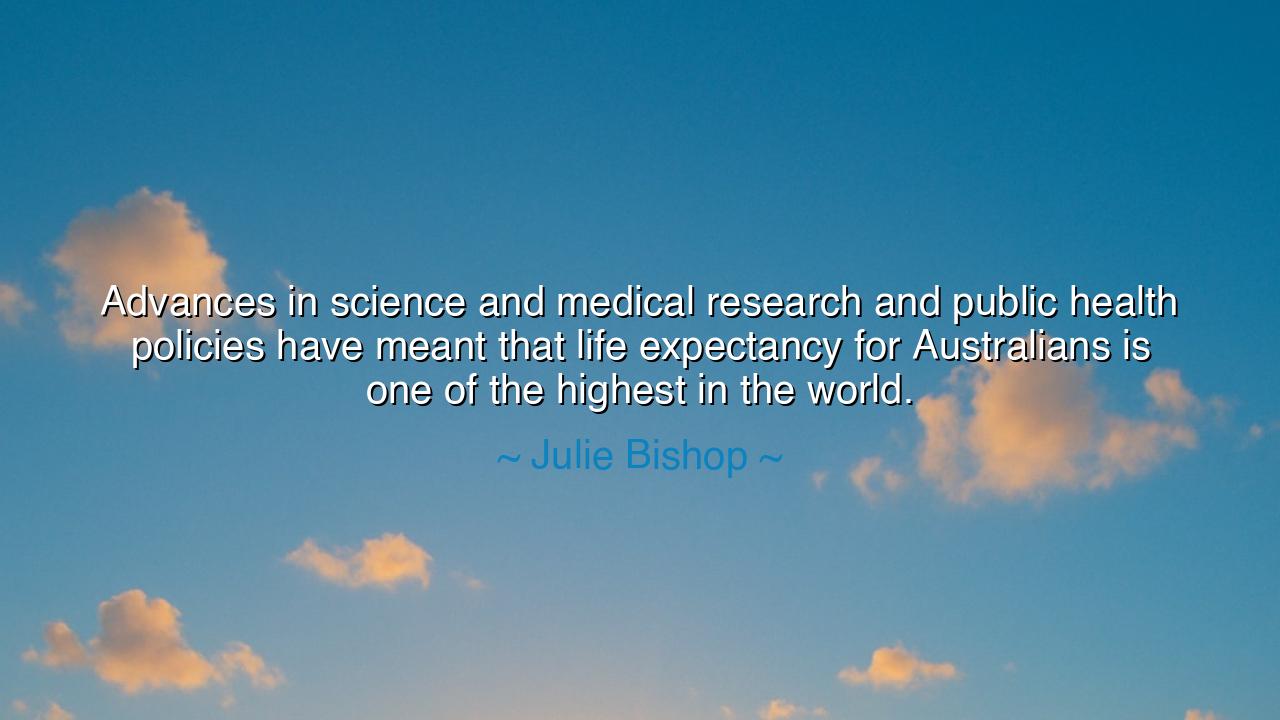
Advances in science and medical research and public health
Advances in science and medical research and public health policies have meant that life expectancy for Australians is one of the highest in the world.






“Advances in science and medical research and public health policies have meant that life expectancy for Australians is one of the highest in the world.” Thus spoke Julie Bishop, a steward of progress and reason, recognizing the triumph of human intellect and compassion over the frailties of mortality. In this saying lies a tribute not only to science but to the collective wisdom of a society that chooses to value life, to protect it, and to nurture it through knowledge. Her words are not cold statistics but a quiet celebration of humanity’s long struggle against death and disease—a struggle waged not with swords, but with understanding, persistence, and faith in discovery.
In the ancient world, long life was the dream of kings and sages alike. They sought it in elixirs, in prayers, in mythic fountains whose waters promised immortality. Yet, what the ancients sought through mysticism, modern man has achieved through science and public health. Julie Bishop’s declaration stands as the echo of this achievement—the victory of medicine over pestilence, of hygiene over ignorance, of research over despair. In her words, we see the unfolding of civilization’s grandest promise: that through unity of purpose and pursuit of truth, humanity may extend not only its years, but the quality of its days.
The heart of her message lies in the sacred trinity of science, medical research, and public health. Each alone is mighty, but together they form the pillars of modern longevity. Science gives us understanding—the knowledge of the body’s mysteries and the forces that govern life and death. Medical research transforms that knowledge into tools of healing, crafting cures, vaccines, and treatments that once seemed impossible. And public health policies, the unseen guardians, ensure that these blessings reach the many, not the few—protecting the poor, the vulnerable, and the forgotten. When these forces act in harmony, as they have in Australia, the result is not merely longer lives, but more hopeful ones.
Consider the story of Sir Howard Florey, the Australian scientist who, alongside Alexander Fleming and Ernst Chain, brought penicillin from the laboratory to the world. Fleming discovered it, but Florey’s team turned that discovery into a medicine that saved millions. Before their work, a small wound or a simple infection could claim a life. But with penicillin, death lost much of its dominion. Soldiers wounded in battle, children sick with pneumonia, mothers stricken with fever—all found deliverance through the labor of science. From this work flowed the rivers of modern medicine, and from those rivers, life expectancy rose like dawn breaking after centuries of night.
Yet, Bishop’s words are not only praise—they are also a reminder of duty. For every victory of medicine brings new challenges. As people live longer, the burdens of age grow heavier: diseases of the heart, of the mind, of the soul. It is not enough to extend life; we must also enrich it. The ancients said, “To lengthen the days without deepening their purpose is to stretch a shadow, not to enlarge the light.” Thus, the work of public health must continue—not merely to preserve existence, but to elevate it, to ensure that longevity is matched by vitality, compassion, and dignity.
And yet, these triumphs are not born from scholars alone—they are the fruit of a people’s trust in knowledge. In every vaccination program, in every clinic built in a distant town, in every law that guards the health of its citizens, there is a quiet act of faith: faith that reason and cooperation can overcome ignorance and fear. When Bishop speaks of life expectancy, she speaks also of unity—the shared effort of scientists, doctors, teachers, and families who all stand together in the defense of life. Such cooperation is the true mark of civilization’s maturity.
So, my children, let this teaching be remembered: knowledge is the healer of nations, and wisdom is the breath that sustains it. Honor the physicians and the researchers, but honor also the humble worker who follows the laws of health, who nurtures the body and respects the gift of life. Support the schools that teach, the institutions that research, and the leaders who defend truth. For every discovery in the laboratory is meaningless if it does not reach the hearts and homes of the people.
In the end, the greatness of a nation is not measured by its armies or its gold, but by how long and how well its people live. Julie Bishop’s words remind us that to cherish life is the noblest act of all—that through science, medical research, and public health, humanity may not conquer death, but may rise above its fear. Let us then live wisely, tend to one another with compassion, and continue the sacred pursuit of knowledge—for in doing so, we fulfill the oldest dream of mankind: not immortality, but a life worthy of the time we are given.






AAdministratorAdministrator
Welcome, honored guests. Please leave a comment, we will respond soon